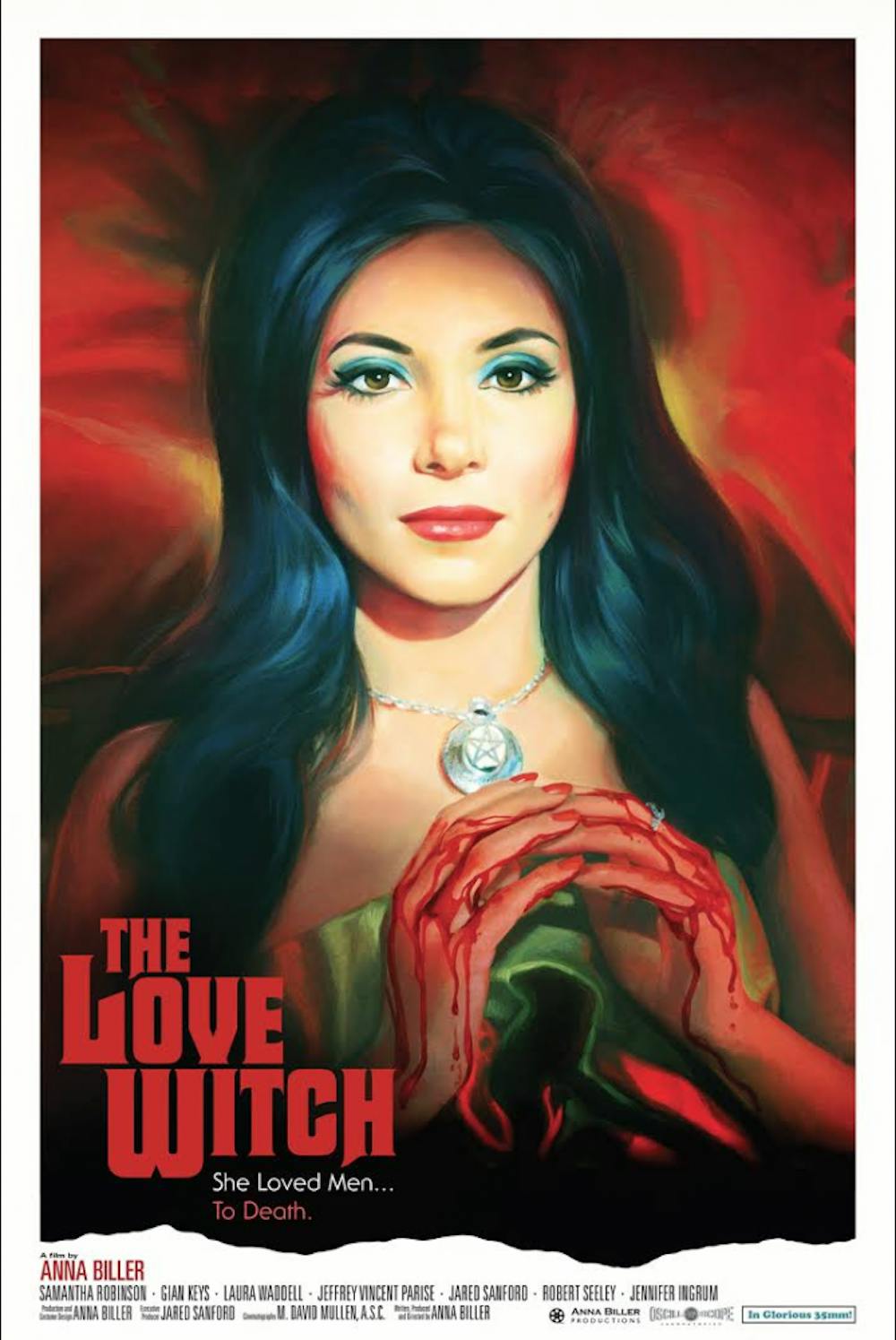During its Virginia Film Festival screening at the Violet Crown Cinema Friday, “The Love Witch” seemed at first glance like a throwback in all senses of the word. Its sumptuous set design emulates the visuals of 1960s Technicolor flicks, and its occult and erotic subject matter seems to be plucked straight from pulpy paperbacks and exploitation features. Its titular heroine, Elaine Parks (Samantha Robinson), is a young, freshly widowed witch whose apparent sole ambition is to make men to love her. Much like Elaine, the movie itself is an artful seductress. The film draws on visual and thematic language of traditional erotic horror in order to satirize the genre’s characteristic misogyny. This classic homage has a distinctly feminine twist.
Anna Biller’s visionary design and editing shine throughout the film. The color palette is saturated with lush pastels and sets are constructed with lavish ornamentation, ranging from Elaine’s stately Victorian home to a saccharine tea room painted in various shades of pink. Each shot feels elaborately constructed, and the cinematography itself has a witty sensibility — a frame of a bloody corpse segues into red sauce oozing from a freshly-cut cake (a shot that reportedly took 12 takes). One of Elaine’s works in progress, a gruesome painting of a nude woman ripping out a man’s heart, foreshadows the finale. Attention to details like these makes the film a work of stunning auteurism.
Fascinatingly, Elaine appears to be a walking anachronism — her matte turquoise eyeshadow, thick false lashes and modish wardrobe all suggest the image of a midcentury femme fatale, yet the film takes place in modern-day California. She is soft-spoken, beguilingly beautiful and pretends to be a damsel in distress despite her mysterious power. Over the course of the movie, she seduces three different men with an ease that betrays her bright-eyed intelligence — while performing a striptease for her first paramour, a libertine professor named Wayne (Jeffrey Vincent Parise), she purrs, “I’m the Love Witch. I’m your ultimate fantasy!”
Despite happily playing the role of a gothic June Cleaver (at least initially), Elaine’s willingness to cater to men’s desires is based on a shrewdly clinical interpretation of romance. In a conversation with Trish (Laura Waddell), a naive good-girl housewife who is startled by Elaine’s unapologetic pursuit of male lust, the latter matter-of-factly remarks, “Giving men sex is a way of unlocking their love potential.”
Things go awry when Elaine’s love potions prove a little too potent — Wayne becomes sickly and emotionally needy after sleeping with her, eventually growing so “heartsick” that he dies the morning after. Her second conquest, Trish’s milquetoast husband Richard (Robert Seeley), eventually slits his wrists after Elaine won’t return his calls. In both cases, longing makes them lapse into infantility and self-centeredness. Elaine is disgusted when she realizes how fragile their masculinity is, bitterly observing, “They teach that a ‘normal’ human being is a hyper-rationalist, stoic male, and that a woman’s intuitions and emotions are illnesses that need to be cured.” The film suggests in reality, the opposite is true.
As the film goes on, Elaine becomes more selfish and arguably sociopathic — her futile quest for romance ultimately culminates in the bloody, visceral murder of her final lover (Gian Keys) when she realizes he’ll never truly reciprocate her affections.
Yet Elaine remains easy to root for throughout, due in part to Robinson’s stylized yet believably tempered performance. Her earnest yearning combined with slick, manipulative capability makes her a fully realized antiheroine. She’s a raven-haired inversion of the icy Hitchcock blonde — a stated influence on Robinson — by way of Medea.
“The Love Witch” is a thrilling, fever-dream feast for the senses, but it’s also a wickedly sharp take on the nature of relationships between men and women.





